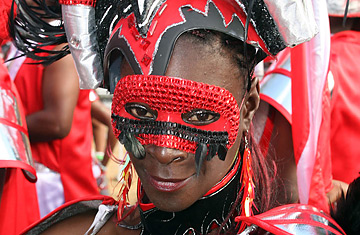
A masquerader of the band "Trini Revelers" parades during the Carnival celebration of Port-of-Spain, Trinidad, February 20, 2007.
When "playing mas," or masquerading in Carnival, partiers follow an organized caravan called a "band" that they have already registered with and chosen a costume from. Some outfits tend to be conservative, like the simple cotton sailor suits worn by one group. Others have elaborate sky-high headdresses and makeshift tails made of feathers that a peacock would envy. But by far the most noticeable are the decorated bikinis worn by the beauty queens — which leave just enough to the imagination. Of course, it simply isn't enough to just watch; being a person of action, I felt the need to don a costume, as part of the TRIBE band, and enjoy a few drinks, a lot of jumping and "wining" — which is what folks in the Caribbean call a dance in which hips gyrate in sync. You should always do this with a partner.
All of these people jump and shout along with their favorite anthems of soca and calypso — particularly favoring Machal Montano, the biggest name in Caribbean music since Bob Marley — blasting from huge trucks equipped with gargantuan sound systems. Rigs of the same size serve a bottomless supply of drinks. "I've always heard about it, so my other expatriate friends talked me into doing this," Fred Bauer, 46, an engineering designer who moved to the country a year ago from Texas, told me. "I'm from the South so I know what Mardi Gras is like. Here, it's a different flavor. Everybody's involved."
Carnival here has its roots in the 18th century, begun by slaves who would dress in costumes to mock their French and Spanish masters during their own pre-lenten festivities. The British colonial administrators, however, were not amused by the mockery and tried to shut down the practice. Riots resulted. Eventually, the slaves won over the authorities with their celebration. Later, the event grew larger and more elaborate. Steel drums were added, and costumes became more flamboyant. As immigrants from India, China and the Middle East arrived, the cultural mix became more intense and Carnival even more colorful. By the time the British granted Trinidad independence in 1962, Carnival had become a national holiday, one in which virtually the entire nation shuts down to party. "It's a celebration of people of all races and cultures. It's the ultimate expression of freedom," said Gregory Reece, 26, a store manager who chatted with me as I danced past his home. "I don't think there are many other countries where you can see Hindus, Muslims and Christians jumping together for two straight days."
Actually, this takes place for more than just two days. Trinidadians begin to prepare for the event right after Christmas, and the fetes, or pre-Carnival parties, go on nightly for weeks before the actual event. Still, not everyone in the country is a fan of the event. The Trinidad Express reported that at least 60,000 people left the island for fear of crime, overcrowding and debauchery during the festival. But in the eyes of the revelers, that only makes room for more of those who each year spend much of their time working out to be as fit (and beautiful) as possible for the festival.
As the various bands wind through the streets of Port-of-Spain, the masqueraders pass in front of stages to be judged. It becomes easy to forget that anything other than Carnival ever took place here. Trinis are a very proud lot and both they and Brazilians claim to have the largest Carnival. At this point, I'm not one to gauge the nationalistic claims. Let's save that for the rest of the week, when I'm nursing my aching legs.
